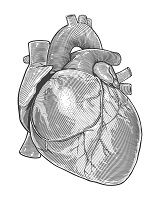Article
HIV: No Added Risk of Cardio Events with Atazanavir
Author(s):
There is no significant risk of increased cardiovascular events associated with drug regimens containing atazanavir, according to the results of a recent study

There is no significant risk of increased cardiovascular events associated with drug regimens containing atazanavir, according to the results of a recent study. Published in BMC Infectious Diseases, the study was conducted by Lisa Rosenblatt, MD, of Bristol-Myers Squibb, and colleagues.
Previous studies found that individuals with human immunodeficiency virus (HIV+) are at an increased risk of cardiovascular (CV) disease. Additional work showed that some protease inhibitors (PIs) were associated with CV, and with myocardial infarction in particular. The researchers say, “However, there is not as much data available with more recently approved PIs, and the available studies have not found the same association with CV disease.”
One drug, atazanavir (ATV) has been studied in both an analysis and a randomized clinical trial and the results, according to the researchers, “suggest that not all medications within the PI class have the same CV risk profile.” They undertook the present study to confirm the findings of the two previous studies, and say, “the primary objective of this claims-based analysis was to compare incidence rates and hazards of CV events between antiretroviral-naive HIV+ patients initiating ATV-containing versus ATV-free ARV [antiretroviral] regimens.”
The researchers examined claims data from 22,211 patients in a commercial claims database and from 7,163 patients in a Medicare database. “In the commercial sample, approximately 11% of patients initiated an ATV-containing regimen,” report the researchers, adding, “there were significantly fewer males in the ATV-containing regimen cohort than the ATV-free cohort.”
The authors found, “CV events were rare in both databases,” adding, “there was no significant increase in the risk of CV events associated with exposure to ATV-containing ARV regimens compared with ATV-free regimens.” The results remained the same through follow up 24 months later.
The researchers note that, although other research seems to indicate an association between PIs and an increased risk of CV events, “it does not appear to be a universal class effect.” This study confirms the results of prior studies in finding “there is no association between ATV exposure and increased risk for CV events,” say the researchers, concluding, “this is an important consideration when selecting the appropriate HIV regimen for patients at increased risk of CV disease.”
Further Coverage:
Promising Strategy to Reduce Heart Disease in People with HIV
Depression Contributes to Heart Attack Risk in HIV Positive People
ART Can't Reduce HIV-AAssociated Arterial Inflammation
2 Commerce Drive
Cranbury, NJ 08512
All rights reserved.





